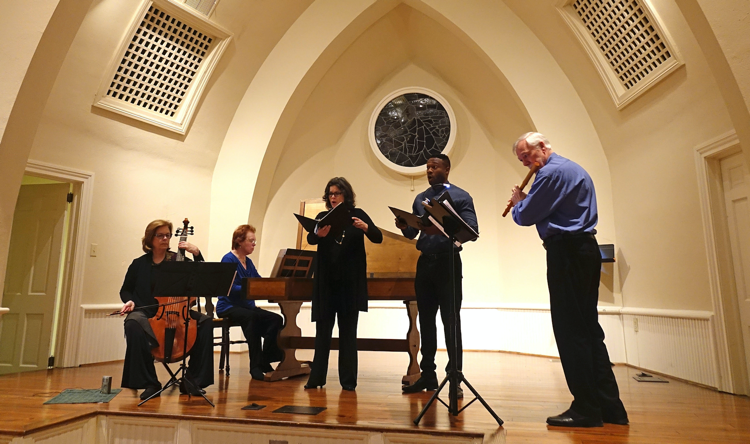
By Perry Tannenbaum
CHARLOTTE, N.C. — Come to a rehearsal of Carolina Pro Musica and you visit the cozy home of the group’s founder, Karen Hite Jacob, in Charlotte’s wooded Elizabeth neighborhood. Past the porch and the parlor, you enter the hub of the home, a dining room that opens up to the rest of the house, bedrooms and study to your left and kitchen straight ahead. The voice of soprano Rebecca Miller Saunders, polishing the last strains of “Solo per voi tra mille” from Handel’s cantata Pastorella, vagha bella, carries easily to the front porch, signaling that rehearsal has already begun.
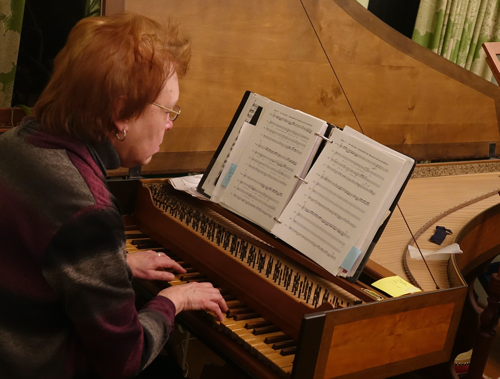
Sidling past Edward Ferrell, already poised behind his music stand to play his transverse flute in a Bach aria, you find Jacob at her harpsichord at the opposite corner. Next to the leader sits Holly Wright Maurer, her viola da gamba nestled between her knees. You can’t say she’s in the rhythm corner with Jacob because, in this intimate space, she partially obstructs the way to the kitchen.
Carolina Pro Musica has been playing early music since 1977, when Jacob, after founding the Charlotte Chamber Music Workshop and its baroque ensemble, the Carolina Consort, broke away. Because lawyers confirmed that she couldn’t take the Consort name with her, she drew up papers with a new name to seal the separation. Ferrell, a student at Central Piedmont Community College when Jacob taught there, joined the ensemble at the end of the 1978-79 season after earning his degree at the New England Conservatory.
Saunders and Maurer didn’t arrive until Carolina Pro Musica had undergone a few other permutations of personnel, always with the same basic instrumental-vocal makeup, with guest artists tossed into the mix. In fact, when Saunders first sang with the group in 1992, it was as a guest artist at a pair of Christmas concerts, shortly after graduate studies at Indiana University’s Institute for Early Music. Wedding bells and a one-year sojourn in New York intervened before Saunders and her husband returned to Charlotte.
“I reunited with the group after running into Eddie at a local soccer game,” Saunders recalls. “At that point, Holly entered the scene, and we became the foursome that you see today.”
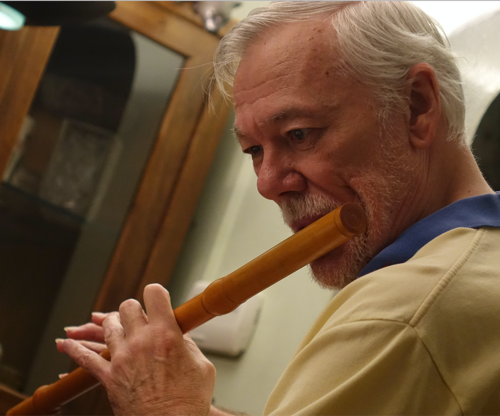
Once again, Ferrell was a factor in Maurer’s joining. Shortly after arriving in 1994 with her husband and three sons, Maurer went to a Carolina Pro Musica concert and recognized a name. While Maurer was completing her graduate work in early music performance at the New England Conservatory, Ferrell had been an undergrad there. The timing was as serendipitous as their meeting, because Pro Musica was losing its viol player.
During a post-concert chat, Maurer arranged an audition with Jacob. The completed group has played contentedly together for over 22 years. When needed, Maurer adds an extra dimension to the instrumentation, for she can play a second flute or recorder behind Ferrell on pieces that call for it.
“Despite the fact that I started as a flute player,” she says, “I am most content playing viola da gamba. From the moment I first heard it, I was attracted to the mellow sound.” Teaming up with Jacob as the group’s “left hand” continuo may bring Maurer inner joy, but outwardly she’s a study in concentration and precision, tuning her gamba with an electronic device between pieces.
Crossed-up on the meeting arrangements, guest artist Carl DuPont arrives at rehearsal just in time for his vocal duet, the famed “Mein Freund ist mein” from Bach’s “Wachet Auf!” cantata. When the bass-baritone sings as Jesus opposite Saunders’ Soul later in the week at the Sharon Presbyterian Chapel, he will need to hold back to keep from overpowering the hall. So he really needed to hold back in this quaint rehearsal space.
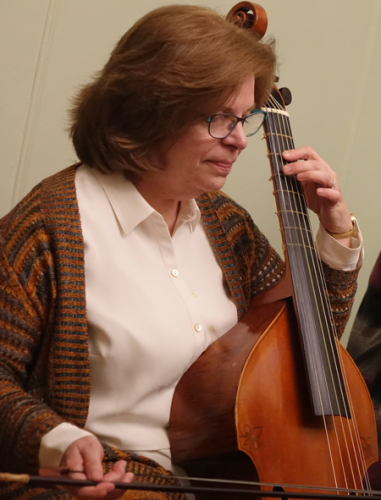
DuPont, who made his Opera Carolina debut in La fanciulla del West in April 2017, unquestionably has operatic power, but he’s hardly new to early music, having been invited to participate in the XXth International Johann Sebastian Bach Competition last year in Leipzig, Germany. Tasked with preparing two hours of compulsory repertoire for the competition, DuPont reached out to Carolina Pro Musica so that he could feel more comfortable with the music.
One week before his flight to Leipzig, DuPont and Pro Musica previewed his competitive performances in a free concert at Belmont Abbey College, where Jacob’s bulging portfolio of instructional and performance duties includes directing the Arts at the Abbey concert series. It’s a collegial doorway that swings both ways, since DuPont has been an assistant professor of voice at UNC Charlotte since 2014.
Two or three run-throughs of “Mein Freund” are performed to get the tempo right for Saunders, allow DuPont to adjust his projection, and give Ferrell, playing the oboe part on flute, the chance to wrestle with Bach’s zigzags from major to minor. With the concert just days away, interchange between the artists is relaxed and quiet, not a sliver of anxiety in the air. Without anything being said, the ensemble adjourns to the kitchen after a rehearsal that has ended less than 50 minutes past the time I was told it would start.
In the kitchen, it turns out, the musicians aren’t munching or snacking as anticipated. Three stacks of newly printed paper need folding so they can become the 12 pages of program booklet copy for Pro Musica’s upcoming concert, “Harmony of the Spheres or The Vault of Heaven.” Every sheet is in full color, handsomely designed with two-sided printing. Marketing is as professional here as the musicianship.
An outer cover of finer glossy paper completes the booklet, providing consistency for the ensemble’s 39th season. When each set of papers is properly folded and aligned, the cover is draped over the new program, becoming a booklet with a single staple punched into the middle of its spine.
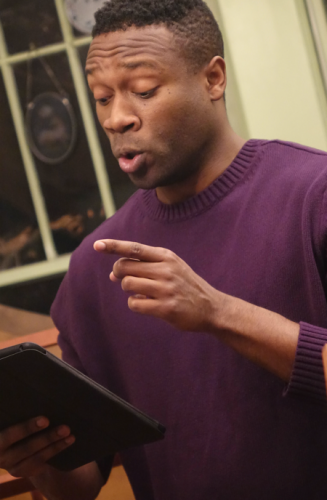
So I leave the Jacobs home thinking that Carolina Pro Musica is something of a cottage industry. The other outsider, DuPont, feels similarly, as it turns out. What he finds unique is the family feel of the group’s synchronicity and rehearsal dynamic, reminding him of the gospel trio he, his mother, and his sister formed when he was younger.
DuPont may be on to something. In a follow-up interview, Ferrell says his relationship with Jacob actually dates back to 1973, when she heard him play a Handel sonata for a music history class. Overhearing the performance, Jacob asked him to play at her upcoming wedding. “So my first public performance on the recorder was in her wedding [that year].”
Notwithstanding their homespun warmth and industry, Carolina Pro Musica isn’t at all provincial — or tethered in their programming to Bach and Handel. In the “Harmony of the Spheres” concert dominated by Bach, Handel, and Telemann, there was room for a gamba sonata Johannes Schenck (1660-1712), a name absent from most music encyclopedias, while the “Paris au Printemps” program in April roamed through works by Clerambault, Morel, Jacquet de La Guerre, and LeClair.
When Ferrell was getting his master’s in musicology at UNC Chapel Hill, he ran across a listing of cantatas for flute, soprano, and continuo by Johann Hasse (1699-1783) in the music library. That was enough to set Jacob off on an epic quest for manuscripts in libraries across Europe — Germany, the UK, and Sweden — so Carolina Pro Musica could publish performing editions of the works.
“The hang-up was a copy from the Benedictine monastery at Montecassino,” Jacob remembers. “No letter on my behalf from Belmont Abbey got acknowledged back around 2003 or 2004. I decided to try again in 2014 and got an email response to a letter translated to Italian for me by a monk here at the Abbey.”
Jacob was able to photograph the manuscript — “probably the autograph” — at the monastery, enabling Carolina Pro Musica to publish its own edition of Hasse’s “Pallido il volto.” A journey to the Montserrat Monastery in Spain and jousts by various members of the group with Catalan texts and chant notation led to the Pro Musica’s edition of the Llibre Vermell — years before the manuscript was available online.
Themes and songs for concerts have also come from places as far-flung as Arequipa, Charlotte’s sister city in Peru, and St. Petersburg, where Jacob visited Catherine the Great’s theater and the music museum at Sheremetev Palace, which boasts a diverse collection of instruments that includes keyboards once owned by famous Russian composers. Less frequently, the entire ensemble travels together. They flew to Wrocław, Charlotte’s sister city in Poland, for a 1994 visit that included performances and teaching early-music history.
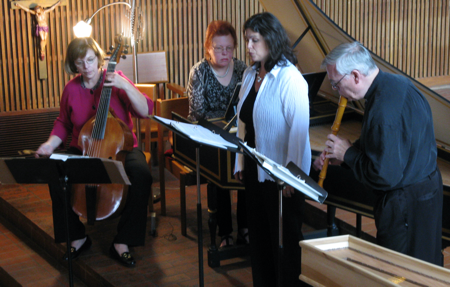
Mostly fondly remembered among the group’s travels was the London trip in 2005, when Pro Musica performed at Hatchlands Park and at Handel’s House before it became a museum. “The house has historic instruments belonging to various composers, too,” says Jacob of the Hatchlands concert, “so we got a treat after the great lunch they fixed for us.”
Looking ahead to their 40th season, starting in September, and beyond, the musicians are eager to explore a variety of Pro Musica possibilities. Widening their horizons with new guest artists is one likely direction. Larger productions — like their “Bach Church Service” in 2000, celebrations of the ensemble’s 25th and 35th anniversaries, or the more recent collaboration with the UNC Charlotte Chorale — are another option. A lingering trove of manuscript photocopies, yet to be turned into performing editions and public performances, also beckons.
Ferrell is enthused about the near future as well: “I am really excited about our plans to do a performance next season of Bach’s complete cantata BWV 152, ‘Tritt auf die Glaubensbahn.’ It uses only two singers, a soprano, and a bass, along with recorder, oboe, viola d’amore, and viola da gamba.” He already has a candidate in mind for the viola d’amore part.
On the same night Carolina Pro Musica performed its “Paris au Printemps” concert at St Martin’s Episcopal Church, DuPont returned to Sharon Presbyterian Chapel. He sang the role of Pontius Pilate in a staged production of Bach’s St. John Passion, presented by the Firebird Arts Alliance under the direction of David Tang.
It’s significant that Tang is the founding father of the Firebird, for he is also music director at Sharon Presbyterian. With firm roots at Belmont Abbey, UNC Charlotte, Central Piedmont Community College, and Sharon Presbyterian, the Carolina Pro Musica family has good reasons to be optimistic about the continued vitality of early music in and around Charlotte.
Perry Tannenbaum has been covering the performing arts in Charlotte for the past 30 years, mainly as the chief cultural writer at Creative Loafing – and at his own ArtOnMySleeve.net website. He also writes about music for American Record Guide, BroadwayWorld.com, CVNC.org, JazzTimes, and AllAbout Jazz.

